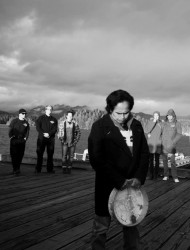Article Origin
Volume
Issue
Year
The capsizing of the whale watching tour boat Leviathan II off the West Coast of Vancouver Island has brought the vulnerabilities of search and rescue capabilities into sharp focus.
Many are calling for First Nations communities to have an official rescue role in search and rescue services.
First Nations men fishing in the area where the Leviathan II was swamped by a rogue wave, sending 27 passengers and crew into the cold waters 14 km west of Tofino, were the only ones to see a single flare sent up by those struggling to survive. They rushed to the emergency and pulled several people from the waters, but their calls to the Coast Guard communications station in Prince Rupert proved frustrating.
The communication centre in nearby Ucluelet had been recently closed by the Stephen Harper Conservative government, and those manning the Prince Rupert station, 650 kms away, didn’t know the local name for the rocky outcrop where the ship was in distress. On the Coast Guard charts,
the area is called Cleland Island, but locals know the area as Bear Island.
Tony Cook, a fisherman, was at the Tofino dock when he heard the emergency called in by Ahousaht fisherman Clarence Smith. He said the Coast Guard took a while to “clue in” and had Smith repeating himself over and over.
Finally skipper Rob Barton of the Georgia Prince broke into the call. “Break, message relay,” he said. “He’s telling you there are people in the water, people on the rocks.”
The Tyee newspaper talked to a Coast Guard employee who too was listening to the call. "It was very loud. The guy was talking about people in the water, there was screaming in the background.”
Giving up on the Coast Guard, Smith turned to a place he knew where help was available. He called out to the community of Ahousaht, and water taxi boats were soon coming to the rescue from that community and nearby Tla-o-qui-aht First Nation.
They saved 21 people, recovered five. The body of one man has not been found.
The next day, the Nuu-chah-nulth Tribal Council called on newly-elected Prime Minister Justin Trudeau “to reverse a decade of decline in marine search and rescue under the Harper government and invest in life-saving equipment in our First Nations communities.”
Photo caption: Joe Martin of the Tla-o-qui-aht First Nation leads people during a candlelight vigil on the dock at Tofino for the victims of the Leviathan II sinking. Photo by Deb Steel
“They’re the ones saving us anyway,” said Tony Cook. He said the First Nations’ quick response is what saved lives that day, and the Coast Guard response would have been too late.
Joe Spears, manager director of the Horseshoe Bay Marine Group in West Vancouver, said the Leviathan sinking demonstrates how crucial First Nations are in emergencies on the water.
Spears said the current structure for marine response is too 'fragmented'. He said it would also be critical for the economy.
“When you look at eco-tourism, we’re bringing people to a very rugged and dangerous coastline,” he told CBC. “We're letting them loose, and then when something happens, we shouldn’t be thinking, well, we’ll think of something as it occurs.”
NTC President Deb Foxcroft agrees. “As greater and greater numbers of tourists flock to experience our ‘Wild West Coast,’ this tragic accident highlights once again how suddenly a day on the water, even aboard a well-equipped vessel with a well-trained crew, can turn deadly.”
“As in previous marine accidents in B.C. coastal waters, while the Coast Guard and Canadian Marine Search and Rescue scrambled to deploy their resources, local First Nations… responded to the distress flare and arrived in time to pull survivors out of the water.
“Our Nuu-chah-nulth people have operated their vessels in B.C. coastal waters since time immemorial, and have accumulated a priceless body of knowledge. When a marine emergency arises, our people take to their boats without hesitation, often in extremely hazardous conditions.”
Foxcroft pointed out the need for specialized equipment. “Not only should our communities be equipped with emergency warming blankets, night-vision goggles and defibrillators, but larger vessels would benefit from more sophisticated equipment such as forward-looking infrared (FLIR) devices that allow searchers to locate survivors even in extreme conditions. Ideally, each community would have the appropriate rescue and first aid equipment ready for immediate deployment.”
- 2128 views

